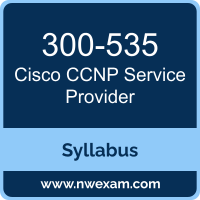 A great way to start the Cisco Certified DevNet Specialist Service Provider Automation and Programmability (SPAUTO) preparation is to begin by properly appreciating the role that syllabus and study guide play in the Cisco 300-535 certification exam. This study guide is an instrument to get you on the same page with Cisco and understand the nature of the Cisco CCNP Service Provider exam.
A great way to start the Cisco Certified DevNet Specialist Service Provider Automation and Programmability (SPAUTO) preparation is to begin by properly appreciating the role that syllabus and study guide play in the Cisco 300-535 certification exam. This study guide is an instrument to get you on the same page with Cisco and understand the nature of the Cisco CCNP Service Provider exam.
Our team of experts has composed this Cisco 300-535 exam preparation guide to provide the overview about Automating Cisco Service Provider Solutions exam, study material, sample questions, practice exam and ways to interpret the exam objectives to help you assess your readiness for the Cisco SPAUTO exam by identifying prerequisite areas of knowledge. We recommend you to refer the simulation questions and practice test listed in this guide to determine what type of questions will be asked and the level of difficulty that could be tested in the Cisco CCNP Service Provider certification exam.
Cisco 300-535 Exam Overview:
| Exam Name | Automating Cisco Service Provider Solutions |
| Exam Number | 300-535 SPAUTO |
| Exam Price | $300 USD |
| Duration | 90 minutes |
| Number of Questions | 55-65 |
| Passing Score | Variable (750-850 / 1000 Approx.) |
| Recommended Training | |
| Exam Registration | PEARSON VUE |
| Sample Questions | Cisco 300-535 Sample Questions |
| Practice Exam | Cisco Certified DevNet Specialist Service Provider Automation and Programmability Practice Test |
Cisco 300-535 Exam Topics:
| Section | Weight | Objectives |
|---|---|---|
| Network Programmability Foundation | 10% |
- Utilize common version control operations with git (add, clone, push, commit, diff, branching, and merging conflict) - Describe characteristics of API styles (REST and RPC) - Describe the challenges encountered and patterns used when consuming APIs synchronously and asynchronously - Interpret Python scripts containing data types, functions, classes, conditions, and looping - Describe the benefits of Python virtual environments - Explain the benefits of using network configuration tools such as Ansible and Terraform for automating IOS XE or IOS XR platforms. |
| Automation APIs and Protocols | 30% |
- Describe the characteristics and use of YANG Data Models (OpenConfig, IETF, and Vendor) - Describe common HTTP authentication mechanisms (basic, token, and oauth) - Compare common data types (JSON, XML, YAML, plain text, gRPC, and protobuf) - Interpret the JSON instance based on a YANG model - Interpret the XML instance based on a YANG model - Interpret a YANG module tree generated by pyang - Implement configuration and operation management using RESTCONF protocol - Implement configuration and operation management using NETCONF protocol - Compare the NETCONF datastores |
| Network Device Programmability | 30% |
- Deploy device configuration and validate operational state using ncclient - Construct a Python script using NETCONF with YDK, including YANG Suite - Deploy device configuration and validate operational state using NetMiko - Deploy device configuration and validate operational state using Ansible playbooks - Compare gNMI with NETCONF and gRPC - Construct a Python script using RESTCONF, including YANG Suite - Construct Xpath notation for a given node or instance of a node - Diagnose model-driven dial-in/-out telemetry streams with gRPC for a Cisco IOS XR |
| Automation and Orchestration Platforms | 30% |
- Describe ETSI NFV - Describe NSO architecture - Describe Cisco Crosswork Network Controller and applications - Construct a Python script to configure a device using NSO RESTCONF API - Describe the management and automation of Cisco ESC components - Implement SR-PCE (formerly XTC), including topology information transfer to SR PCE - Describe Cisco WAE - Construct a service template using NSO - Deploy a service package using NSO |
Cisco SPAUTO Exam Description:
Automating Cisco Service Provider Solutions v1.1 (SPAUTO 300- 535) is a 90-minute exam associated with the CCNP Service Provider Certification and DevNet Professional Certification. This exam tests a candidate's knowledge of implementing service provider automated solutions, including programming concepts, orchestration, programming OS, and automation tools. The course, Implementing Cisco Service Provider Automation Solutions, helps candidates to prepare for this exam.
